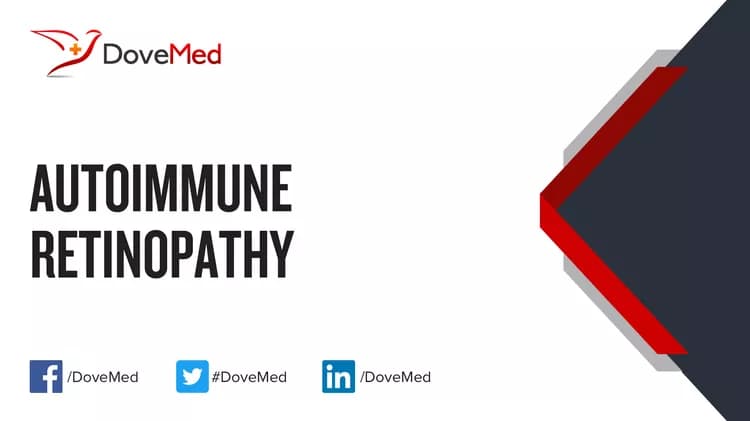What are the other Names for this Condition? (Also known as/Synonyms)
- AIR (Autoimmune Retinopathy)
What is Autoimmune Retinopathy? (Definition/Background Information)
- Autoimmune Retinopathy represents a spectrum of rare autoimmune diseases that primarily affect retinal photoreceptor function and lead to progressive vision loss
- Included in this spectrum are cancer-associated retinopathy (CAR), melanoma-associated retinopathy (MAR), and presumed non-paraneoplastic Autoimmune Retinopathy (npAIR)
- Autoimmune Retinopathy typically presents in the fifth and sixth decades with rapidly progressive, bilateral, painless visual deterioration. Examination of the fundus (the back inner part of the eye) is usually normal at presentation
- The underlying reason for the autoimmune attack on retinal cells remains unknown
- Treatment includes systemic immunosuppression with steroid and steroid-sparing agents, intravenous immunoglobulin(IVIG), and plasmapheresis (plasma exchange)
(Source: Autoimmune Retinopathy; Genetic and Rare Disease Information Center (GARD) of National Center for Advancing Translational Science (NCATS), USA.)
Who gets Autoimmune Retinopathy? (Age and Sex Distribution)
- Autoimmune Retinopathy is a rare disorder. The presentation of symptoms typically occur in the 40-60 year’ age group
- Although both genders may get affected, the condition is more common in females
- Worldwide, individuals of all racial and ethnic groups may be affected
What are the Risk Factors for Autoimmune Retinopathy? (Predisposing Factors)
The risk factors for Autoimmune Retinopathy may include:
- Certain cancers
- Chemotherapy for cancer
It is important to note that having a risk factor does not mean that one will get the condition. A risk factor increases one’s chances of getting a condition compared to an individual without the risk factors. Some risk factors are more important than others.
Also, not having a risk factor does not mean that an individual will not get the condition. It is always important to discuss the effect of risk factors with your healthcare provider.
What are the Causes of Autoimmune Retinopathy? (Etiology)
- The cause of Autoimmune Retinopathy, in which one’s antibodies mistakenly attack the retinal cells, is not known at the present time
- The condition is associated with certain cancers elsewhere in the body and/or chemotherapy for cancer treatment
What are the Signs and Symptoms of Autoimmune Retinopathy?
The signs and symptoms of Autoimmune Retinopathy may include:
- Impaired vision
- Decreased night vision
- Blind spots in the field of vision
- Light-sensitivity
- Partial color blindness
- Impaired contrast sensitivity
How is Autoimmune Retinopathy Diagnosed?
Autoimmune Retinopathy is diagnosed on the basis of the following information:
- Complete physical examination
- Thorough medical history evaluation
- Assessment of signs and symptoms
- Eye tests, including vision acuity and examination of the back of the eye
- Laboratory tests
- Imaging studies
- Biopsy studies, if necessary
Many clinical conditions may have similar signs and symptoms. Your healthcare provider may perform additional tests to rule out other clinical conditions to arrive at a definitive diagnosis.
What are the possible Complications of Autoimmune Retinopathy?
The complications of Autoimmune Retinopathy may include:
- Rapid progression of vision impairment
- Blindness
Complications may occur with or without treatment, and in some cases, due to treatment also.
How is Autoimmune Retinopathy Treated?
The treatment for Autoimmune Retinopathy may include the following measures:
- Systemic immunosuppression with steroid and steroid-sparing agents
- Intravenous immunoglobulin (IVIG)
- Plasmapheresis (plasma exchange)
(Source: Autoimmune Retinopathy; Genetic and Rare Disease Information Center (GARD) of National Center for Advancing Translational Science (NCATS), USA.)
How can Autoimmune Retinopathy be Prevented?
The cause of Autoimmune Retinopathy is not known, and hence, no preventive guidelines or methods are available for this condition.
- Seeking medical treatment at the onset of symptoms may help slow progression of the condition
- Active research is currently being performed to explore the possibilities for treatment and prevention of disorders such as Autoimmune Retinopathy
- Regular medical screening at periodic intervals with tests and physical examinations are recommended
What is the Prognosis of Autoimmune Retinopathy? (Outcomes/Resolutions)
- The prognosis of Autoimmune Retinopathy is dependent upon an early diagnosis and prompt treatment
- Typically, the prognosis may be assessed on a case-by-case basis
Additional and Relevant Useful Information for Autoimmune Retinopathy:
The following DoveMed website link is a useful resource for additional information:
Related Articles
Test Your Knowledge
Asked by users
Related Centers
Related Specialties
Related Physicians
Related Procedures
Related Resources
Join DoveHubs
and connect with fellow professionals


0 Comments
Please log in to post a comment.